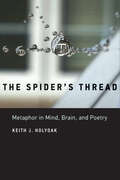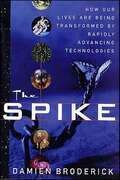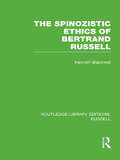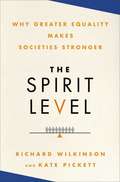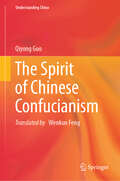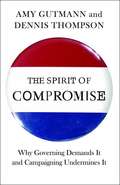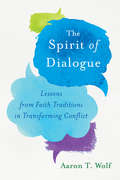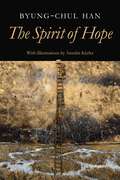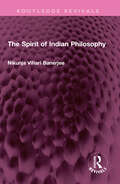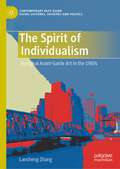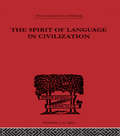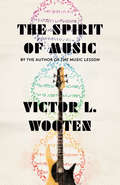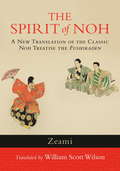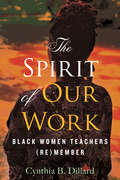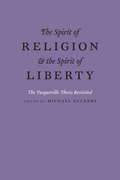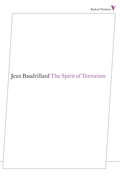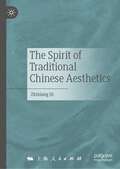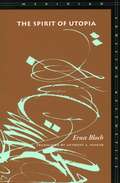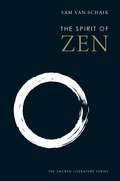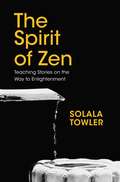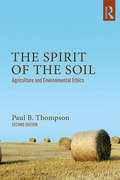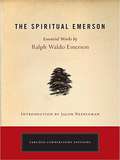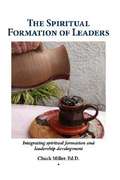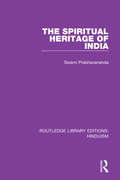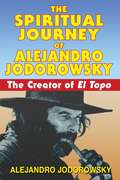- Table View
- List View
The Spider's Thread: Metaphor in Mind, Brain, and Poetry (The\mit Press Ser.)
by Keith J. HolyoakAn examination of metaphor in poetry as a microcosm of the human imagination—a way to understand the mechanisms of creativity.In The Spider's Thread, Keith Holyoak looks at metaphor as a microcosm of the creative imagination. Holyoak, a psychologist and poet, draws on the perspectives of thinkers from the humanities—poets, philosophers, and critics—and from the sciences—psychologists, neuroscientists, linguists, and computer scientists. He begins each chapter with a poem—by poets including Samuel Taylor Coleridge, Sylvia Plath, Walt Whitman, Emily Dickinson, Robert Frost, Theodore Roethke, Du Fu, William Butler Yeats, and Pablo Neruda—and then widens the discussion to broader notions of metaphor and mind. Holyoak uses Whitman's poem “A Noiseless Patient Spider” to illustrate the process of interpreting a poem, and explains the relevance of two psychological mechanisms, analogy and conceptual combination, to metaphor. He outlines ideas first sketched by Coleridge—who called poetry “the best words in their best order”—and links them to modern research on the interplay between cognition and emotion, controlled and associative thinking, memory and creativity. Building on Emily Dickinson's declaration “the brain is wider than the sky,” Holyoak suggests that the control and default networks in the brain may combine to support creativity. He also considers, among other things, the interplay of sound and meaning in poetry; symbolism in the work of Yeats, Jung, and others; indirect communication in poems; the mixture of active and passive processes in creativity; and whether artificial intelligence could ever achieve poetic authenticity. Guided by Holyoak, we can begin to trace the outlines of creativity through the mechanisms of metaphor.
The Spike: How Our Lives Are Being Transformed by Rapidly Advancing Technologies
by Damien BroderickThe rate at which technology is changing our world--not just on a global level like space travel and instant worldwide communications but on the level of what we choose to wear, where we live, and what we eat--is staggeringly fast and getting faster all the time. The rate of change has become so fast that a concept that started off sounding like science fiction has become a widely expected outcome in the near future - a singularity referred to as The Spike. At that point of singularity, the cumulative changes on all fronts will affect the existence of humanity as a species and cause a leap of evolution into a new state of being. On the other side of that divide, intelligence will be freed from the constraints of the flesh; machines will achieve a level of intelligence in excess of our own and boundless in its ultimate potential; engineering will take place at the level of molecular reconstruction, which will allow everything from food to building materials to be assembled as needed from microscopic components rather than grown or manufactured; we'll all become effectively immortal by either digitizing and uploading our minds into organic machines or by transforming our bodies into illness-free, undecaying exemplars of permanent health and vitality. The results of all these changes will be unimaginable social dislocation, a complete restructuring of human society and a great leap forward into a dazzlingly transcendent future that even SF writers have been too timid to imagine.At the Publisher's request, this title is being sold without Digital Rights Management Software (DRM) applied.
The Spinozistic Ethics of Bertrand Russell (Routledge Library Editions: Russell)
by Kenneth BlackwellBertrand Russell’s professional philosophical reputation rests mainly on his mathematical logic and theory of knowledge. In this study, first published in 1985, however, Kenneth Blackwell considers Russell’s writings on ethics and metaethics and uncovers the conceptual unity in Russell’s normative ethic. He traces that unity to the influence of Spinoza’s central ethical concept, the ‘intellectual love of God’, and then evaluates the ethic which he terms ‘impersonal self-enlargement’. The introduction discusses the metaethical background to Russell’s ethic and the difficulties inherent in Russell’s view that ethical knowledge is not possible. The first section then examines Russell’s writings on Spinoza from 1894 to 1964, dividing them into three periods, the second part analyzes Russell’s two interpretations of the main concept, traces 'impersonal self-enlargement' in Russell’s own ethical writings, and evaluates the ethic in relation to other ethical theories and on its own merits as a ‘way of living’. This book provides a foundation for a positive re-evaluation of Russell’s status in the major philosophical field of ethics and will be welcomed by students of moral philosophy as well as those interested in Bertrand Russell’s works.
The Spirit Level: Why Greater Equality Makes Societies Stronger
by Robert B. Reich Kate Pickett Richard WilkinsonThis eye-opening UK bestseller shows how one single factor--the gap between its richest and poorest members--can determine the health and well-being of a society. "This is a book with a big idea, big enough to change political thinking."--Sunday Times.
The Spirit of Chinese Confucianism (Understanding China)
by Qiyong GuoThis book provides a comprehensive overview of the spirit of Chinese Confucianism, which is usually regarded as one of the most important aspects of traditional Chinese culture. In addition to the general history, the book explores the extensive concepts of Confucianism, such as its philosophy, core values and social ideals, humanistic theories, ritual and music culture, and statecraft and wisdom of governance. Beyond the introductory information, it ushers Confucianism into the modern realm, discussing and elaborating on its humanistic spirit characteristics, its significance and value in the modern context, and how it should be engaged in the creative transformation of economic globalization.The book is divided into twelve chapters, each developing from a single focal point to cover a vast array of knowledge that combines philosophy, academics, and readability. It brings Confucianism to the readers by explaining complex and profound Confucian philosophy and actions in a language that is accessible.
The Spirit of Compromise
by Amy Gutmann Dennis ThompsonIf politics is the art of the possible, then compromise is the artistry of democracy. Unless one partisan ideology holds sway over all branches of government, compromise is necessary to govern for the benefit of all citizens. A rejection of compromise biases politics in favor of the status quo, even when the rejection risks crisis. Why then is compromise so difficult in American politics today? In The Spirit of Compromise, eminent political thinkers Amy Gutmann and Dennis Thompson connect the rejection of compromise to the domination of campaigning over governing--the permanent campaign---in American democracy today. They show that campaigning for political office calls for a mindset that blocks compromise--standing tenaciously on principle to mobilize voters and mistrusting opponents in order to defeat them. Good government calls for an opposite cluster of attitudes and arguments--the compromising mindset--that inclines politicians to adjust their principles and to respect their opponents. It is a mindset that helps politicians appreciate and take advantage of opportunities for desirable compromise.Gutmann and Thompson explore the dynamics of these mindsets by comparing the historic compromises on tax reform under President Reagan in 1986 and health care reform under President Obama in 2010. Both compromises were difficult to deliver but only tax reform was bipartisan. Drawing lessons from these and other important compromises--and failures to compromise--in American politics, Gutmann and Thompson propose changes in our political institutions, processes, and mindsets that would encourage a better balance between campaigning and governing.Calling for greater cooperation in contemporary politics, The Spirit of Compromise will interest all who care about whether their government leaders can work together.
The Spirit of Dialogue: Lessons from Faith Traditions in Transforming Conflict
by Aaron T. WolfWe tend to approach conflict from the perspective of competing interests. A farmer's interest lies in preserving water for crops, while an environmentalist's interest is in using that same water for instream habitats. It's hard to see how these interests intersect. But what if there was a different way to understand each party's needs?Aaron T. Wolf has spent his career mediating such conflicts, both in the U.S. and around the world. He quickly learned that in negotiations, people are not automatons, programed to defend their positions, but are driven by a complicated set of dynamics—from how comfortable (or uncomfortable) the meeting room is to their deepest senses of self. What approach or system of understanding could possibly untangle all these complexities? Wolf's answer may be surprising to Westerners who are accustomed to separating religion from science, rationality from spirituality.Wolf draws lessons from a diversity of faith traditions to transform conflict. True listening, as practiced by Buddhist monks, as opposed to the "active listening” advocated by many mediators, can be the key to calming a colleague's anger. Alignment with an energy beyond oneself, what Christians would call grace, can change self-righteousness into community concern. Shifting the discussion from one about interests to one about common values—both farmers and environmentalists share the value of love of place—can be the starting point for real dialogue.As a scientist, Wolf engages religion not for the purpose of dogma but for the practical process of transformation. Whether atheist or fundamentalist, Muslim or Jewish, Quaker or Hindu, any reader involved in difficult dialogue will find concrete steps towards a meeting of souls.
The Spirit of Hope
by Byung-Chul HanA spectre is haunting us: fear. We are constantly confronted with apocalyptic scenarios: pandemics, world war, the climate catastrophe. Images of the end of the world and the end of human civilization are conjured up with ever greater urgency. Anxiously, we face a bleak future. Preoccupied with crisis management, life becomes a matter of survival. But it is precisely at such moments of fear and despair that hope arises like a phoenix from the ashes. Only hope can give us back a life that is more than mere survival. Fear isolates people and closes them off from one another; hope, by contrast, unites people and forms communities. It opens up a meaningful horizon that re-invigorates and inspires life. It nurtures fantasy and enables us to think about what is yet to come. It makes action possible because it infuses our world with purpose and meaning. Hope is the spring that liberates us from our collective despair and gives us a future. In this short essay on hope, Byung-Chul Han gives us the perfect antidote to the climate of fear that pervades our world.
The Spirit of Indian Philosophy (Routledge Revivals)
by Nikunja Vihari BanerjeeFirst published in 1975 The Spirit of Indian Philosophy provides a systematic overview of Indian philosophy. The book is divided into four major parts dealing with Indian epistemology, Indian metaphysics, Indian ethics, and Indian philosophy of religion. It makes a departure from usual method of investigating Indian philosophy by dealing with its different schools individually and separately. It discusses themes like sources of cognition; nature and criterion of true cognition; problem of error; materialism; realism; dualism; Indian theories of causation; reflective morality; the ethics of non-violence; Indian atheism and Indian religion of God, to argue that the usual conception of Indian philosophy in general as religious, spiritualistic and pessimistic is contrary to the fact, that the doctrine of Karma, transmigration and rebirth, strictly speaking is incompatible with the Indian ways of thinking and in deed is an imposition upon them ab extra. This is an essential read for scholars and students of Indian philosophy.
The Spirit of Individualism: Shanghai Avant-Garde Art in the 1980s (Contemporary East Asian Visual Cultures, Societies and Politics)
by Lansheng ZhangThis book is about avant-garde art in Shanghai in the 1980s which challenges the narrative in the current discourse on the appearance of contemporary art in China. Offering fresh perspectives and new insights into the art and the artists of this period, the book includes critical events in Shanghai, that will attract the serious attention of art professionals and collectors. The emergence of the Shanghai art scene in the 1980s mirrors the revitalisation of Shanghai that was tasked to lead China’s economic development trajectory onto the world stage. Shanghai, with its semi-colonial, political, economic and cultural history, including the strong legacy of the early twentieth century modernist art movement, has played a vital role in China’s modernisation and presents itself as a unique case in the evolution of contemporary art in China.
The Spirit of Language in Civilization (International Library of Philosophy)
by K. VosslerFirst published in 2000. Routledge is an imprint of Taylor & Francis, an informa company.
The Spirit of Music: The Lesson Continues
by Victor L. WootenGrammy Award winner Victor Wooten's inspiring parable of the importance of music and the threats that it faces in today's world. We may not realize it as we listen to the soundtrack of our lives through tiny earbuds, but music and all that it encompasses is disappearing all around us. In this fable-like story three musicians from around the world are mysteriously summoned to Nashville, the Music City, to join together with Victor to do battle against the "Phasers," whose blinking "music-cancelling" headphones silence and destroy all musical sound. Only by coming together, connecting, and making the joyful sounds of immediate, "live" music can the world be restored to the power and spirit of music.A VINTAGE ORIGINAL
The Spirit of Noh: A New Translation of the Classic Noh Treatise the Fushikaden
by Zeami William Scott WilsonThe Japanese dramatic art of Noh has a rich six-hundred-year history and has had a huge influence on Japanese culture and such Western artists as Ezra Pound and The Japanese dramatic art of Noh has long held a fascination for people both in the East and the West. For six hundred years it has had a huge influence on Japanese culture--and has inspired such Western artists as Ezra Pound and William Butler Yeats. Here is a translation of the Fushikaden, a seminal treatise on Noh by the fifteenth-century actor and playwright Zeami (1363-1443), the most celebrated figure in the art's history. His writings on Noh were originally secret teachings that were later coveted among the highest ranks of the samurai class and first became available to the general public only in the twentieth century. The Fushikaden is the best known of Zeami's writings on Noh and it provides practical instruction for actors, gives valuable teachings on the aesthetics and spiritual culture of Japan, and offers a philosophical outlook on life. Along with the Fushikaden, translator William Scott Wilson includes a comprehensive introduction describing the intriguing history behind this enigmatic and influential art form, and also a new translation of one of Zeami's most moving plays, Atsumori.
The Spirit of Our Work: Black Women Teachers (Re)member
by Cynthia DillardAn exploration of how engaging identity and cultural heritage can transform teaching and learning for Black women educators in the name of justice and freedom in the classroomIn The Spirit of Our Work, Dr. Cynthia Dillard centers the spiritual lives of Black women educators and their students, arguing that spirituality has guided Black people throughout the diaspora. She demonstrates how Black women teachers and teacher educators can heal, resist and (re)member their identities in ways that are empowering for them and their students. Dillard emphasizes that any discussion of Black teachers&’ lives and work cannot be limited to truncated identities as enslaved persons in the Americas.The Spirit of Our Work addresses questions that remain largely invisible in what is known about teaching and teacher education. According to Dillard, this invisibility renders the powerful approaches to Black education that are imbodied and marshaled by Black women teachers unknown and largely unavailable to inform policy, practice, and theory in education. The Spirit of Our Work highlights how the intersectional identities of Black women teachers matter in teaching and learning and how educational settings might more carefully and conscientiously curate structures of support that pay explicit and necessary attention to spirituality as a crucial consideration.
The Spirit of Religion and the Spirit of Liberty: The Tocqueville Thesis Revisited
by Michael ZuckertTocqueville’s thesis on the relation between religion and liberty could hardly be timelier. From events in the Middle East and the spread of Islamist violence in the name of religion to the mandated coverage under the Affordable Care Act, the interaction between religion and politics has once again become central to political life. Tocqueville, facing the coming of a new social and political order within the traditional society that was France, faced this relation between politics and religion with freshness and relevance. He was particularly interested in reporting to his French compatriots on how the Americans had successfully resolved what, to many Frenchmen, looked to be an insuperable conflict. His surprising thesis was that the right kind of arrangement—a certain kind of separation of church and state that was not also a complete separation of religion and politics—could be seen in nineteenth century America to be beneficial to both liberty and religion. This volume investigates whether Tocqueville’s depiction was valid for the America he investigated in the 1830s and whether it remains valid today.
The Spirit of Terrorism
by Jean Baudrillard Chris TurnerBaudrillard sees the power of the terrorists as lying in the symbolism of slaughter--not merely the reality of death, but in a sacrifice that challenges the whole system. Where previously the old revolutionary sought to conduct a struggle between real forces in the context of ideology and politics, the new terrorist mounts a powerful symbolic challenge which, when combined with high-tech resources, constitutes an unprecedented assault on an over-sophisticated and vulnerable West. This new edition is up-dated with the essays "Hypotheses on Terrorism" and "Violence of the Global."From the Trade Paperback edition.
The Spirit of Traditional Chinese Aesthetics
by Zhixiang QiThis book differentiates between and analyzes the Confucian, Taoist and Buddhist spirit in traditional Chinese aesthetics, explains the core characteristics and methods of traditional Chinese aesthetics, and conveys the author’s overall thinking on the spirit of traditional Chinese aesthetics. Given its scope, the book is of great value in terms of understanding and promoting China’s unique traditional culture.
The Spirit of Utopia
by Ernst BlochThe Spirit of Utopia is one of the great historic books from the beginning of the century, but it is not an obsolete one. In its style of thinking, a peculiar amalgam of biblical, Marxist, and Expressionist turns, in its analytical skills deeply informed by Simmel, taking its information from both Hegel and Schopenhauer for the groundwork of its metaphysics of music but consistently interpreting the cultural legacy in the light of a certain Marxism.
The Spirit of Zen (The Spirit of ...)
by Sam Van SchaikAn engaging introduction to Zen Buddhism, featuring a new English translation of one of the earliest Zen texts Leading Buddhist scholar Sam van Schaik explores the history and essence of Zen, based on a new translation of one of the earliest surviving collections of teachings by Zen masters. These teachings, titled The Masters and Students of the Lanka, were discovered in a sealed cave on the old Silk Road, in modern Gansu, China, in the early twentieth century. All more than a thousand years old, the manuscripts have sometimes been called the Buddhist Dead Sea Scrolls, and their translation has opened a new window onto the history of Buddhism. Both accessible and illuminating, this book explores the continuities between the ways in which Zen was practiced in ancient times, and how it is practiced today in East Asian countries such as Japan, China, Korea, and Vietnam, as well as in the emerging Western Zen tradition.
The Spirit of Zen: The Classic Teaching Stories on The Way to Enlightenment
by Solala TowlerZen is probably the most well known yet misunderstood version of Buddhism in the West. The Spirit of Zen presents the most basic principles and practices of Zen in a simple yet authentic fashion. The Spirit of Zen guides you down the path to enlightenment with stories, history and practical guidance from the masters of Zen. Often the stories contained in these teachings are an attempt to shake the student out of his or her complacent accepting of 'things as they are.' By bypassing the ordinary mindset, the often puzzling actions of the Zen master to his students awaken something in them they didn't know they had. This is all part of the attempt of the master to awaken the student to the reality of his or her own being and place in the great scheme of things. By using these radical forms of teaching, the master is jolting the student out of any preconceptions they may have about spiritual attainment. Thus the famous dictum 'If you see the Buddha in the road, kill him.' The stories are arranged according to theme: Gradual Enlightenment, Sudden Enlightenment, Teaching Stories, Paradoxical Teaching, Eccentric Masters etc. Most of them are from traditional sources with some original additions from Taoist expert Solala Towler. The simple yet profound truths of spiritual practice and awakening are often best learned from stories, rather than ponderous dissertation. These stories are profound and illuminating while also being entertaining, contain the kernel or true flavor of Zen.
The Spirit of the Soil: Agriculture and Environmental Ethics
by Paul B. ThompsonIn this second edition of The Spirit of the Soil: Agriculture and Environmental Ethics, Paul B. Thompson reviews four worldviews that shape competing visions for agriculture. Productionists have sought increasing yields—to make two seeds grow where only one grew before—while traditional visions of good farming have stressed stewardship. These traditional visions have been challenged by two more worldviews: a call for a total cost accounting for farming and an advocacy for a holistic perspective. Thompson argues that an environmentally defensible systems approach must draw upon all four worldviews, recognizing their flaws and synthesizing their strengths in a new vision of sustainable agriculture. This classic 1995 study has been thoroughly revised and significantly expanded in its second edition with up-to-date examples of agriculture’s impact on the environment. These include extensive discussions of new pesticides and the effects of animal agriculture on climate and other areas of the environment. In addition, a new final chapter discusses sustainability, which has become a dominant idea within environmental studies and agrarian political philosophy.
The Spiritual Emerson
by Ralph Waldo Emerson Jacob NeedlemanThis concise volume collects the core writings that have made Ralph Waldo Emerson into a key source of insight for spiritual seekers of every faith--with an introduction by the bestselling philosopher Jacob Needleman. Here is the essential collection of Emerson's spiritual thought for those readers who understand the transformative quality of ideas. It is concise and suited to years of rereading and contemplation, offering the essays that trace the arc of the inner message brought by America's "Yankee Mystic." The Spiritual Emerson features many of Emerson's landmark works. Yet also included are overlooked classics, such as the essays "Fate" and "Success," which served as major sources of inspiration to some of the leading American metaphysical thinkers of the late nineteenth and early twentieth centuries. The introduction by religious scholar and philosopher Jacob Needleman frames--historically and philosophically--the development of Emerson's thought and explores why it has such a powerful hold on us today.
The Spiritual Formation of Leaders
by Chuck Miller"The Spiritual Formation of Leaders" invites readers to deeper intimacy with Christ so, in Him, they will be empowered to enjoy rich community with one another and a life of fruitful ministry. (Christian) Chuck Miller has lived what he teaches. The book brings together spiritual formation/discipleship and leadership development. Should be required reading for every Christian leader.
The Spiritual Heritage of India (Routledge Library Editions: Hinduism #10)
by Swami PrabhavanandaThis book, first published in 1962, is an analysis of the history of the philosophy of a country that has never distinguished philosophy from religion. Indian philosophy is not merely metaphysical speculation, but has its foundation in immediate perception. This insistence upon immediate perception rather than abstract reasoning is what distinguishes the Indian philosophy of religion from philosophy as Western nations know it.
